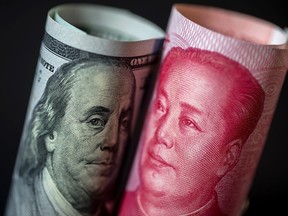U.S. is in the top five when it comes to foreign direct investment exposure
Article content
By David Rosenberg and Atakan Bakiskan
The Chinese economy has headed into a severe slowdown, with its economy entering deflationary terrain and the property sector remaining in crisis mode. The economic downfall will weigh negatively on the global economy, primarily through trade channels on countries with a high dependency on China.
Article content
The disappointing economic data of late from the world’s second-largest economy (Citi Economic Surprise Index at a depressed -23.1 level) will not only impact the domestic consumer, but also have spillover effects such as a setback in commodity prices and shrinking profit margins for companies with exposure to China’s economy.
Advertisement 2
Article content
The largest commodity consumer in the world has posted dreadful trade numbers lately: exports (-8.8 per cent year over year in August) have come in negative for the past four months, and, similarly, imports (-7.3 per cent) declined year over year for the sixth consecutive month. The narrowing current account surplus is only one indicator of China’s depressed demand: a minus 22 per cent quarter-over-quarter annualized contraction in the secondary industry (includes manufacturing and construction in the second quarter), the third-largest year-over-year slump in industrial exports (-6.4 per cent in July) since October 2009, and the record-high youth unemployment rate all point to sluggish demand for longer.
With two-way trade making up 40 per cent of gross domestic, slumping exports/imports will inevitably have ripple effects on China’s trading partners. The United States, Japan and South Korea are the top three countries that have the largest trade inflow/outflow with China. With the U.S., we already see evidence of the friend-shoring theme — moving away from China and shifting the factory orders to India, Vietnam, Mexico and Brazil (winners from China’s economic descent). And as the producer price index (PPI) and export prices in China remain in deflationary terrain, this will help China’s trading partners (mainly the U.S.) in their battle against inflation.
Article content
Advertisement 3
Article content
Countries with a high dependency on China will suffer the most through the trade channel from a secular Chinese slowdown. China consumes a significant portion of the exports coming from Chile (40 per cent), Australia (34 per cent), Peru (32 per cent), Vietnam (29 per cent), New Zealand (29 per cent) and Brazil (27 per cent). So, these countries will be the most vulnerable to the weakening demand in China.
The commodity sector is also highly dependent on China as it accounts for half the world’s basic materials consumption and a quarter of total oil imports. As the property/infrastructure bubble bursts, this will hurt mineral-exporting countries (Brazil, Australia, Peru and Chile) the most. Australia accounts for 56 per cent of total iron ore exports, and Brazil for 18 per cent. And China imports a massive 70 per cent of the world’s iron ore, which is not-so-great news for the Australian economy.
In addition to iron ore, China is also the world’s largest importer of copper. On the exports side, Chile is the largest copper exporter (26 per cent), Peru is the second (15 per cent) and Indonesia the third (10 per cent).
Advertisement 4
Article content
Foreign direct investment in China
Direct investment liabilities (a common measure for foreign direct investment) in China fell to US$4.9 billion in the second quarter — the lowest level in 25 years and down 87 per cent year over year. In the first quarter of 2022, it was standing at US$101 billion, and is now almost down 95 per cent from that level.
The declining foreign investment in China will show itself in the trade numbers as the exports from foreign companies in China are approximately 30 per cent of total Chinese exports. The deteriorating FDI will not show up in the GDP data, but will result in lower profit margins for companies operating in China. The MSCI World with China Exposure index (composed of companies with significant revenue exposure to China) is already down seven per cent month over month.
Countries with larger investments in China will be more sensitive to the economy’s downfall. Singapore has the highest foreign direct investment (as measured by the amounts of contracts utilized) in China, followed by South Korea, Japan, Germany and the U.S. So, when some pundits say “don’t worry about the United States, it doesn’t export much to China,” what is missing from that statement is that the U.S. is in the top five when it comes to foreign direct investment exposure in China. And the companies that operate there with a view towards serving the Chinese economy (and the rest of Asia) are surely going to see a dampening effect on their worldwide profits and from that indirect effect, end up having negative repercussions for the stock market (or at least those companies with footholds in China who will be affected).
Advertisement 5
Article content
-

Commodities in your asset mix will boost returns
-

Great China slowdown has wider implications than meet the eye
-

My recession call has the haters out in force, but I’ve been here before
Bottom line: the most abrupt spillover effect of the contraction in the property sector and depressed demand in China will be in commodities, mainly copper (down six per cent since the end of July peak). Mineral exporting countries such as Australia, Peru, Chile and Brazil are expected to see their respective currencies and trade balance weaken amid the secular demand downturn in China. As foreign direct investments continue to decline, the outlook is not too bright either for companies operating in China.
David Rosenberg is founder of independent research firm Rosenberg Research & Associates Inc. Atakan Bakiskan is a junior economist. To receive more of David Rosenberg’s insights and analysis, you can sign up for a complimentary, one-month trial on the Rosenberg Research website.
Bookmark our website and support our journalism: Don’t miss the business news you need to know — add financialpost.com to your bookmarks and sign up for our newsletters here.
Article content
Who will suffer most from China’s economic downfall
2023-09-12 18:14:11






Comments
Postmedia is committed to maintaining a lively but civil forum for discussion and encourage all readers to share their views on our articles. Comments may take up to an hour for moderation before appearing on the site. We ask you to keep your comments relevant and respectful. We have enabled email notifications—you will now receive an email if you receive a reply to your comment, there is an update to a comment thread you follow or if a user you follow comments. Visit our Community Guidelines for more information and details on how to adjust your email settings.
Join the Conversation